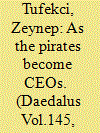|
|
|
Sort Order |
|
|
|
Items / Page
|
|
|
|
|
|
|
| Srl | Item |
| 1 |
ID:
144200


|
|
|
|
|
| Summary/Abstract |
The early Internet witnessed the flourishing of a digitally networked public sphere in which many people, including dissidents who had little to no access to mass media, found a voice as well as a place to connect with one another. As the Internet matures, its initial decentralized form has been increasingly replaced by a small number of ad-financed platforms, such as Facebook and Google, which structure the online experience of billions of people. These platforms often design, control, influence, and “optimize” the user experience according to their own internal values and priorities, sometimes using emergent methods such as algorithmic filtering and computational inference of private traits from computational social science. The shift to a small number of controlling platforms stems from a variety of dynamics, including network effects and the attractions of easier-to-use, closed platforms. This article considers these developments and their consequences for the vitality of the public sphere.
|
|
|
|
|
|
|
|
|
|
|
|
|
|
|
|
| 2 |
ID:
135902


|
|
|
|
|
| Summary/Abstract |
Recently, social movements have shaken countries around the world. Most of these movements have thoroughly integrated digital connectivity into their toolkits, especially for organizing, gaining publicity, and effectively communicating. Governments, too, have been adapting to this new reality where controlling the flow of information provides new challenges. This article examines the multiple, often novel, ways in which social media both empowers new digitally-fueled movements and contributes to their apparent weaknesses in seemingly paradoxically ways. This article also integrates the evolving governmental response into its analysis. Social media’s empowering aspects are real and profound, but these impacts do not play out in a simple, linear fashion. The ability to scale-up quickly using digital infrastructure has empowered movements to embrace their horizontalist and leaderless aspirations, which in turn have engendered new weak- nesses after the initial phase of street actions ebbs. Movements without organizational depth are often unable to weather such transitions. While digital media create more possibilities to evade censorship, many governments have responded by demonizing and attacking social media, thus contributing to polarized environments in which dissidents have access to a very different set of information compared to those more loyal to the regime. This makes it hard to create truly national campaigns of dissent. This article provides an overview of this complex, evolving environment with examples ranging from the Tahrir Square protests in Egypt to the Occupy movement.
|
|
|
|
|
|
|
|
|
|
|
|
|
|
|
|
|
|
|
|
|